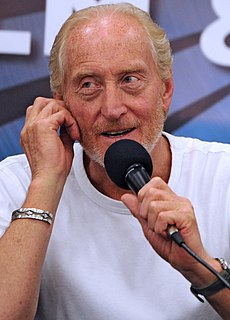A Quote by Ralph Waldo Emerson
Culture implies all which gives the mind possession of its own powers, as languages to the critic, telescope to the astronomer. Culture alters the political status of an individual. It raises a rival royalty in a monarchy. 'Tis king against king. It is ever a romance of history in all dynasties--the co-presence of the revolutionary force in intellect. It creates a personal independence which the monarch cannot look down, and to which he must often succumb.
Quote Topics
Against
Cannot
Creates
Critic
Culture
Down
Ever
Force
Gives
History
Implies
Independence
Individual
Intellect
King
Languages
Look
Mind
Monarch
Monarchy
Must
Often
Own
Personal
Personal Independence
Political
Possession
Powers
Presence
Raises
Revolutionary
Rival
Romance
Royalty
Status
Succumb
Telescope
Tis
Which
Related Quotes
The status quo is a product of our culture or our culture is a product of the status quo - I'm sure which is the effect and which is the product - there is probably a feedback loop there that is mutually reinforcing. But we have a culture that says "Hey, look around. This place called Earth was created for you and you can do anything you want with it."
English character and English freedom depend comparatively little on the form which the Constitution assumes at Westminster. A centralised democracy may be as tyrannical as an absolute monarch; and if the vigour of the nation is to continue unimpaired, each individual, each family, each district, must preserve as far as possible its independence, its self-completeness, its powers and its privilege to manage its own affairs and think its own thoughts.
You are therefore able to run on this path, on which God is found above all vision, hearing, taste, touch, smell, speech, sense, rationality, and intellect. It is found as none of these, but rather above everything as God of gods and King of all kings. Indeed, the King of the world of the intellect is the King of kings and Lord of lords in the universe.
Even personal tastes are learned, in the matrix of a culture or a subculture in which we grow up, by very much the same kind of process by which we learn our common values. Purely personal tastes, indeed, can only survive in a culture which tolerates them, that is, which has a common value that private tastes of certain kinds should be allowed.
These, then, are the four kinds of royalty. First the monarchy of the heroic ages; this was exercised over voluntary subjects, but limited to certain functions; the king was a general and a judge, and had the control of religion The second is that of the barbarians, which is a hereditary despotic government in accordance with law. A third is the power of the so-called Aesynmete or Dictator; this is an elective tyranny. The fourth is the Lacedaemonian, which is in fact a generalship, hereditary and perpetual.
In a democracy, every ordinary citizen is effectively a king--but a king in a constitutional democracy, a monarch who decides only formally, whose function is merely to sign off on measures proposed by an executive administration. This is why the problem with democratic rituals is homologous to the great problem of constitutional monarchy: how to protect the dignity of the king? How to maintain the appearance that the king effectively makes decisions, when we all know this not to be true?
Here in the U.S., culture is not that delicious panacea which we Europeans consume in a sacramental mental space and which has its own special columns in the newspapers - and in people's minds. Culture is space, speed, cinema, technology. This culture is authentic, if anything can be said to be authentic.
From the viewpoint of political power, culture is absolutely vital. So vital, indeed, that power cannot operate without it. It is culture, in the sense of the everyday habits and beliefs of a people, which beds power down, makes it appear natural and inevitable, turns it into spontaneous reflex and response.









































